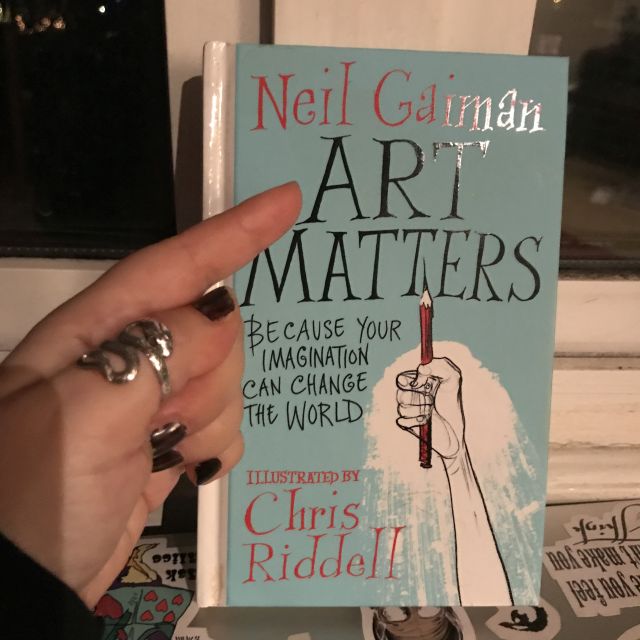From Art Matters by Neil Gaiman. Illustrated by Chris Riddell.

The best writing advice will always be the writing advice that inspires you to get on with the writing. Inspires, not instructs: no there is no great secret, yes it’s hard work and practise makes improvement. My favourite writing guide and favourite memoir, Stephen King’s On Writing, reminds us Dumbo made it into the air because of the magic feather clutched in his trunk, even though the magic was in him all the time. Writing courses and writing retreats and writing buddies and writing manuals are all great feathers. They can get us up there faster. But the magic is always in the elephant, not the feather.
I have a new feather. It’s Art Matters, a stocking-filler-sized illustrated philosophy of life, art and freelancing. It sits beside my laptop on my windowsill “desk” in the living room. It’s made of three texts by Neil Gaiman – Credo (2015), Why Our Future Depends on Libraries, Reading and Daydreaming (2013) and Making a Chair (2011) – which Chris Riddell has assembled in one illustrated handbook of there not being a handbook: we need to make our mistakes, to get our words out and read them back to ourselves, to hear what we think in order to redraft and say it better. I defy you to find a single page of Art Matters you wouldn’t wear as a t-shirt.
Gaiman’s texts acknowledge and celebrate how bloody hard and equally bloody wonderful it is to find your voice and use it. He also makes clear that the worst enemy to your writing voice is your own worry, and success is no cure for that so you might as well start remembering to enjoy the process now. If I could make one wish/new year’s resolution for all of us – emerging and emergent writers – it would be to harness that trust and enjoyment in the process.
I teach creative writing to adults, i.e. people who have spent a large proportion of life in work and education systems that prime them to look for the “right” answer. Some beginner writers ask if a word was clichéd before trying it in new combinations with other words. Others spend money on bigger thesauruses before daring to draft a story they might have wanted to tell for years. The next step, trusting themselves, is where I or other magic feathers come in, assisting take-off. When someone invests time and money in creative writing, it’s about so much more than becoming a world-famous author (newsflash to Hanif Kureishi perhaps; not to anyone taking the time to read articles here). It’s about daring to speak with your own voice, to explore the world as it could be, and making your voice part of it becoming so. Committing to a creative project or lifestyle is rebellious and dangerous and time-consuming and badly paid and not everyone will understand. But it matters. Only you have your voice; only you can put the time, focus, practise and vision to find the words for it.
Rachel Knightley's short story, 'Before I Walked Away', appears in Uncertainties III (Swan River Press) and was recommended this month in the Washington Post for where best to find the best in modern Weird Fiction. Another short story, 'Duty of Care' was published on 1 November in the Woman's Weekly Fiction Special. Her stories have previously won the 'Promis' Prize for Children's Fiction and first place in Writers' Forum's fiction competition. She is completing her PhD novel in 2019. She runs Green Ink Writers’ Gym for writers of all genres and levels of experience. Say hello or find out more at www.rachelknightley.com and www.greeninkwritersgym.com
Stephen King's book On writing is not a good writing guide. I'm glad I was given a copy and didn't make the mistake of buying one.
Stephen King has a fantastic ability to chill with words, but writer of a creative writing guide, he is not. On writing is a semi autobiographic memoir of little use to a would-be author. What few snippets of advice and references there are in On writing, were taken from other authors creative writing guides.
Oakley Hall, Barnaby Conrad and Sol Stein have written superb books on creative writing.